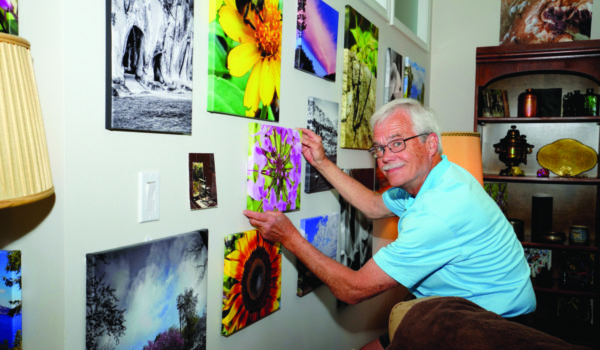
Phil Smith appreciates the details after longtime photography career
By Greg Seiter // Photography by Mark Freeland
Retired photographer Phil Smith made a career out of physically documenting life events but personal experiences have helped the 69-year-old learn to see and embrace things his camera was never able to capture.
Smith, born in Terre Haute but a Franklin resident for most of his life, attended Ball State University as a journalism major and public relations minor while maintaining a childhood interest in photography.
“Ball State was just far enough away from home that mom wouldn’t come unannounced,” he said. “But the school really trained me in the right way.”
After college, he initially worked as a Yellow Pages salesman and even spent time working as a restaurant manager in Muncie.
“Eventually, I decided to retire from the real world and become a chimney sweep in Tennessee,” he said.
That’s when life took a dramatic turn.
“I was cleaning a church flue and all of a sudden, I didn’t feel well. Something was wrong. That’s when I had my very first heart operation. They replaced my aortic valve.
“After that, I was in a wheelchair for three-and-a-half weeks but as a result of that experience, I adopted a new theme for myself. In the face of adversity, we shall prevail.”
Smith returned to Indiana and following his recovery, spent time working for Tranter Industries before eventually deciding to open his own photography business in Franklin.
“I wanted to help people in town with their wedding and commercial needs and I thought photography would be a good way to do that,” he said. “Plus, I loved to travel and I knew photography would really tap into the creative spirit in me.”
However, as would be expected, there were challenges to overcome as he launched a business initially called Photo Arts that would later evolve into Phil Smith Photography.
“Back then, I had to build my own lights,” he said. “There were some struggles but it was wonderful.”
Smith’s 31-year photography career took him to every state except Hawaii and exposed him to a variety of professional industries including education and insurance.
“I had a passion for commercial work and I really enjoyed experimenting with light filtration and composition,” he said. “I shot quite a bit for an insurance trade magazine and traveled frequently for them.”
But Smith seemed to embrace nature-related photography, in particular.
“For a long time, I would go out on my own and travel to different spots so I could take environmental photographs,” he said. “In fact, I’d say some of my most memorable work has been capturing all the different colors in sunrises. Being there in a spot to witness all that magic come to life is special.
“Even something as simple as being close enough to a blade of grass in order to see the beads of early morning dew is amazing.
“That’s my favorite type of photography.”
But Smith, who has served as a wedding officiant for more than 15 years, also developed a passion for Franklin College that afforded him the opportunity to work in a freelance capacity while shooting various events there during a 26-year span. He even once lived in the house where the college’s Napolitan Student Center now stands.
“I covered a lot of what was going on at Franklin College. I documented people and how things work and I gained a true appreciation for people in biology and pre-med … their potential to heal the world or feed the world,” he said. “Those areas became endeared to me.”
So much so in fact that Smith recently designated Franklin College as a $500,000 estate recipient for the purpose of establishing the Phil Smith Engaged Learning Fund.
“I want to provide an opportunity for students and faculty to learn more about their chosen profession beyond the classroom,” Smith said. “It gives me great pleasure knowing they will have the opportunity to learn from a variety of people, places and cultures in order to broaden their knowledge on the topics they are studying. Knowledge is powerful and the only thing that can’t be taken away from you.
“I decided I didn’t want to have money go to several different things.”
Multiple heart surgeries, back problems and the progression of neuropathy have all taken their toll on Smith, now a retiree and Masonic Home resident. In fact, his mobility challenges force him to rely heavily on a roller walker, cane and electric wheelchair.
“My body is slowly but surely going to hell,” he said. “But I have a balcony over a creek at my apartment and from there, I can watch animals interact.”
Being forced to slow down has also helped Smith see things he never took time to notice before.
“I don’t have the ability to walk but I can now spend time in an area that before, when I was busy, I would have walked right past,” he said. “I can really take time to look at things up close.”
As a result, Smith has gained an appreciation for macro photography while focusing on extreme close-up shots of small subjects.
His physical limitations have also inspired him to make walking canes.
“I like getting out into the woods, finding raw product and filing it down,” he said. “I probably have about 35 canes. “Once in a while, I give one away but I really just do it for fun because it makes me feel good.
“I figure someday after I’m gone, all the photographs and canes I have can be used to benefit others, maybe through a group like the Elks Club.”
Smith has even recently taken up straw bale gardening.
“I can’t really hoe and shovel in a garden but I’ve treated hay bales and created areas in them where I can grow stuff,” he said. “I planted potatoes the other day and I even have lettuce on top.”
In spite of his struggles, Smith embraces life now perhaps more so than he ever did before.
“I believe it’s important to live with the innocence of a child and be guided by the wisdom of age,” he said.


